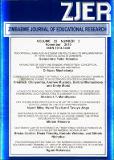| dc.contributor.author | Mandiopera, Shadreck T. | |
| dc.coverage.spatial | Zimbabwe. | en |
| dc.date.accessioned | 2016-02-12T11:30:31Z | |
| dc.date.available | 2016-02-12T11:30:31Z | |
| dc.date.issued | 2010-11 | |
| dc.identifier.citation | Mandiopera, S.T. (2010) A case for teaching development philosophy to science and engineering undergraduates in Zimbabwe's State Universities, Zimbabwe Journal of Educational Research (ZJER), vol. 22, no.3, pp. 293-306. Harare: HRRC. | en |
| dc.identifier.issn | 1013-3445 | |
| dc.identifier.uri | https://opendocs.ids.ac.uk/opendocs/handle/20.500.12413/8968 | |
| dc.description | A ZJER research paper on teaching development philosophy to science students in Zimbabwe's Universities. | en |
| dc.description.abstract | The paper highlights some concepts of socio-economic relevance which have negatively impacted the Education system and introduces a Development Philosophy concept that is required during the training of Engineering, Social and Physical Science Undergraduates in Zimbabwe's State Universities. As a nation we have done well in establishing a sound university education system, but the focus has since shifted from demand for university education to demand for a vibrant economy that provides sufficient employment to its graduates. The progress that has been made in the higher education sector has been phenomenal but still falls short of economic expectations in a number of sectors. It is fact that by and large, the nature of the subjects taught in Sub-Sahara African Universities including our state universities are primarily within the traditional Science and Engineering disciplines and are regularly modified to be in line with global trends in social, technological and scientific advancement. The economic challenges facing Zimbabwe and its State Universities now necessitate a new approach to university education that produces a different type of graduate that is empowered individually, corporately and nationally through a philosophical study of the relationships between economic development, skills, equipment, capital and resource utilization.
This paper also presents the basis for a course of action required for enhancing the education and human resource development in Sub-Saharan Africa, although the focus will be on Zimbabwe through a strategic process of aligning attitudes and understanding towards sustainable socioeconomic growth using state universities and colleges. Globally, some national attitudes can be observed as follows:
(I) Under “similar conditions” one nation will contemplate war with another nation over the death of one or two of its citizens whilst for another nation hundreds have to die before being forced to accept that there is a national disaster.
(Ii) In one nation a large piece of land is turned into a thriving economy whilst in another, similar land is turned into hazardous wasteland. These two precursors highlight strengths and weaknesses that can be embodied in public education systems in shaping socio-economic norms and values. | en |
| dc.language.iso | en | en |
| dc.publisher | Human Resource Research Centre (HRRC), University of Zimbabwe (UZ) | en |
| dc.rights.uri | http://creativecommons.org/licenses/by-nc-nd/3.0/ | en |
| dc.subject | Development Policy | en |
| dc.subject | Education | en |
| dc.title | A case for teaching development philosophy to science and engineering undergraduates in Zimbabwe's State Universities | en |
| dc.type | Article | en |
| dc.rights.holder | University of Zimbabwe (UZ) | en |


